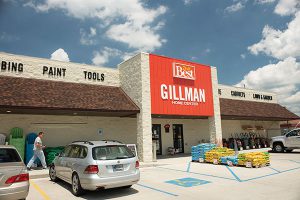Charlie Gillman, Owner and President, Gillman Home Center, 12+ locations in Indiana and Ohio
Charlie followed his father and uncle into a career as a general contractor and spent many years as a homebuilder. He transitioned into home improvement retail in the late 1980s, building the first Gillman Home Center himself. The business has since grown to 12 locations in the Midwest.
Hardware Retailing (HR): What’s the history of Gillman Home Center, and how did you get involved? Was this your first career choice?
Charlie Gillman (CG): This was not my first career choice. In high school, I dreamt of being an architect and a contractor. After high school, I went to a two-year technical school and got an associates degree in architectural technology in 1976.
At the time, my father was a general contractor, and so I came back from college to work with him. I purchased the business from him in 1987 when I was 31 years old.
To supply his business, my father operated a small lumberyard. I attended a hardware convention in 1992, which led me to realize that there was more of an opportunity to serve the general public in the retail sector. In 1993, I built my first store from the ground up. Since then, we have built eight additional locations, and we acquired three more for a current total of 12 stores.
HR: What unique challenges do independent retailers face in today’s market?
CG: While there is increasing pressure with competition from online retailers, we have also seen a nationwide movement toward supporting local businesses. We have to exploit that and also understand that it isn’t a freebee opportunity. There is that growing community support sentiment, but also increased pressure to add more value through service and knowledge. If we provide something Amazon cannot, we can thrive.
Something we do well that big boxes have a hard time doing is building relationships. It’s about price for big boxes. We will let those customers know, apples to apples, that we can take them on. If we get professionals to come in and sit down to review the estimate, we beat big boxes almost every time.
When I used to be a homebuilder, the first thing I had to do was sell myself, and I use that same strategy now. When you get the customer to sit down and meet with you, after a few meetings, they’ve built that relationship with you. Nine times out of 10, you’ll be able to close the sale.
HR: What are some key opportunities independent retailers will have in the short term?
CG: What we can do right now is react so much faster by making our own decisions. We don’t have to deal with the corporate world. There are a lot of people who want to deal locally. They want to deal with people at locally owned stores. Big boxes don’t offer that.
We have 12 locations, and we’re looking at our 13th, which might happen this year. We have each store manager make the location their own. They have the freedom to stock and sell whatever products they want. Big boxes don’t have that freedom.
In our stores, each department head can choose what they want to buy and so does the store manager. We give them the freedom to do that. Each store varies a little bit depending on the strengths of the town and of the employees.
For example, in one of our stores, we sell a lot of feed. One of the employees had his own feed store, and he brought that with him when he joined our team.
We have one incredible lumber and building materials buyer who buys for all 12 locations. We also have a central office with about 16 of us.
HR: What advice would you give to someone considering getting started in the independent industry?
CG: The first thing to do is to start working in the business as early as possible in life and then work in as many different roles in the operation as you can. If your goal is to become a manager or owner, seek a business education. It’s not necessarily about the degree, but there are certain skills you need.
I got a two-year degree, and if I was doing it over again, I would have gotten a bachelor’s degree. A lot of people who come into this industry have to learn finance and accounting on the job. Unless they have that experience in high school, they should pursue at least a two-year degree in business.
My other suggestion is to listen more than you talk, and understand that people in any role or walk of life can offer perspectives that are very valuable.

HR: What do you think the industry will look in five to 10 years?
CG: That’s a very good question. I still feel there will be the same opportunities there are now for the independent retailer. The big boxes have stopped adding locations. The strong contractors will continue to want to deal with locally owned, independent lumberyards, and I do not see that opportunity going away.
Contractors value their time and the best retailers understand the value of that time. That is where independents can always have the edge. We save contractors time with the services we offer, whether that be delivery, takeoff service, even little things like blueprint copies, anything that saves them a stop.
HR: How do you attract new contractors?
CG: Word of mouth. We get a lot of people who are referred to us. People say, “Gillman’s is the place to be, the place to buy from.” That reputation comes from our ability to build relationships with our customers.
We also have an outside sales manager who observes a lot driving around town. Be observant and keep your eyes open. I talked to a contractor recently who told me he was digging a basement in town, so I went back to my sales guy, and I asked him if we had him on our list. It helps to know what’s going on in your area.
HR: Where do you see your business in the next five years to 10 years?
CG: In the past 12 months, we have gone from eight to 12 locations. In five years, we’ll probably add a few more locations, and within 10 years, our goal is to have 20 locations.
I see the company continuing to become more cost efficient. Of course, this is all speculation. We don’t want to seize on opportunities that are not right for us when they come up. The most important thing will always be to make our current locations more successful and help our team members grow and meet their potential in their careers.
HR: What’s the value in furthering your education and networking with other independent retailers?
CG: There is nothing better than networking with other independent retailers because there is unlimited knowledge and value in it. I belong to a roundtable with my co-op that has 18 members. It’s also important to talk about your business with bankers, insurance agents, accountants, attorneys and other advisers.
It’s so important to further your education with thorough product research, which is a tough one. We work closely with our vendors on that. All of our stores are within 90 minutes of my co-op market, which is an advantage we have. We pay for any employee who wants to walk the market to see all the products.
“The primary job of store owners and managers is to take care of employees. Take care of them better than another employer would, and they will serve customers the same way.”
HR: You’re an avid reader. What kinds of things do you read?
CG: I probably read a book a week. I have employees come and ask me, “Charlie, what book are you reading now?” We went on vacation for two weeks, and I read eight to 10 books in that time. I read books while waiting in line at the airport. I hate downtime because it’s important to make use of all your time.
We publish a monthly company newsletter, and every month, I’ll feature a book I’ve read, mainly nonfiction. I’ve read books on accounting, selling skills, personal motivation and other business-related topics. My human resources manager maintains a company library, which probably has 300 to 400 books. Any employee who is interested can come borrow a book or we’ll order a new one for them. They can read it and give it back or they can keep it.

HR: What’s the biggest challenge you have with pricing and how do you manage it?
CG: The biggest challenge with pricing is perception and letting the public know we can compete.
As independent retailers, the biggest thing I think we fight is perception. Big boxes are perceived to be cheaper. And of course, there is the unknown factor with Amazon and how it’s going to affect us long term.
One of the problems with pricing is educating consumers on the difference in product quality, especially in the lumber business. We get asked to price-match a lot. We are glad to do it when we are comparing apples to apples, but it usually isn’t. If you can educate the customers and your team on the price of quality and the cost of poor quality, then the price war is half over.
I made a tool for the employees, a graph that lists lumber prices per quantity for when they answer the phone. If someone calls and says, “How much is a 2x4x8?” the employees know not to give them the price, but to ask how many they want. If the customer says they want 624 of them, we know they aren’t doing something small, and that employee needs to send the customer on to a sales associate.
The next step when it comes to pricing is service. Once you know what they want and how many, the next question is, “Can I set them out for you?” When you approach it that way, you’re asking that customer in an indirect way if they’re going to buy. It makes it so they need to answer your question and make a decision right then if they’re going to buy from you.
HR: What are three things you tell your employees about how to provide great customer service?
CG: There are a few simple things we tell people. No. 1 is to treat people how you want to be treated. Another is to underpromise and overdeliver. For example, if a special order is due in four or five days, tell the customer it will take a week.
Finally, there’s great value in using the customer’s name, calling them back, keeping them in the loop and trying to make every situation a win-win.
The real part of customer service though is having happy employees.
The primary job of store owners and managers is to take care of employees. Take care of them better than another employer would, and they will serve customers the same way.
 Hardware Retailing The Industry's Source for Insights and Information
Hardware Retailing The Industry's Source for Insights and Information








